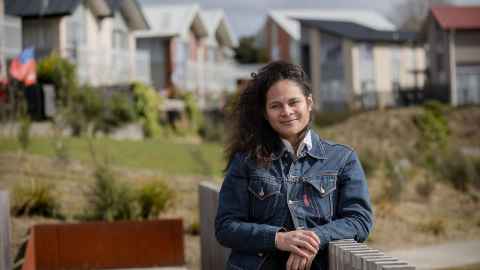We need to talk about Māori and Pacific housing
1 October 2024
OPINION: Dr Karamia Müller says examples of housing that meet the needs and aspirations for Māori and Pacific people need to be considered on a larger scale.

Housing continues to be a pressing issue for the country. Across the housing sector, changing approaches to emergency housing, addressing land supply, and affordable housing have been trialled and discussed.
A conversation that doesn’t occur as often is about the needs and aspirations for Māori and Pacific housing. There are several facets, as housing and health intersect for these communities, which are as just important for other groups as for Māori and Pacific people.
Too often, we hear and see Pacific families bearing the brunt of poor housing through conditions like rheumatic fever, which thrives in cold, damp conditions of New Zealand’s older, poorly insulated housing stock.
The issue was widely highlighted by epidemiologist Jason Gurney (Ngāpuhi) in his book, The Twisted Chain, and the work and research of He Kāinga Oranga and Professor Philippa Howden-Chapman. For Pacific people, the issue of urban displacement is a recurring theme.
While removing urban/rural boundaries may, on the face of it, seem like a productivity-based solution, for Pacific peoples it evokes the memory of ‘gentrification’ in places like Grey Lynn and Ponsonby in the 1970s, and more recently, in Glen Innes, which saw families displaced to city fringes in West and South Auckland.
With more housing developments at the edge of already sprawling urban centres, will we see history repeat itself and see families forced out further and commuting for longer.
Building new houses that are warm, dry, and secure is urgent and necessary. Houses that are close to work opportunities, schools and community hubs. It is critical that Māori and Pacific children live in such homes.
The ‘Going for Housing Growth’ policies champion the freeing up of land for development at urban fringes, enabling intensification through liberalisation and deregulation, and promoting mixed-use developments.
While it may indeed enable housing supply, it is important to ask, at what long term cost? These developments will need strong infrastructure for the next 50 years, and it is important that everyone benefits fairly. The cost of favouring fancy suburbs over other areas will be a price paid by future generations of New Zealanders.
Building new houses that are warm, dry and secure is urgent and necessary.
Houses that are close to work opportunities, schools and community hubs. It is critical that Māori and Pacific children live in such homes.
At MĀPIHI Māori and Pacific Housing Research Centre, a transdisciplinary research centre at the University of Auckland, we seek to investigate better ways for Māori and Pacific whānau to live in healthy, sustainable and affordable homes.
What that would like is threefold: self-determined Māori and Pacific housing industries, housing intensification and health connections for Māori and Pacific people, and successful papakāinga and Pacific community housing.
For the later we can look to community housing providers (CHPs) like Penina Health Trust, led by CEO Tupuola Roine Lealaiauloto. Penina Health Trust have built brand new solar-powered homes for Pacific families. And they’ve recognised the vital need to provide multigenerational homes as a key to Pacific family well-being.
Māori housing also often needs to be more communal, and family orientated. Te Puni Kōkiri supports the development of papakāinga on whenua Māori, which is on a small-scale of under ten homes at a time.
Wouldn’t it be great to see some on a larger scale?
Media contact: Michael Colhoun, michael.colhoun@auckland.ac.nz
Originally published by New Zealand Herald, Kāinga poor-er: We cannot accept bad housing for Māori & Pasifika